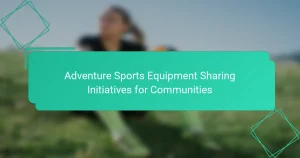Adventure sports workshops provide essential skill enhancement and valuable networking opportunities for enthusiasts. Participants engage in hands-on experiences, improve technical abilities, and build connections within the community. These workshops focus on various activities like rock climbing, kayaking, and mountain biking, emphasizing safety training and teamwork. Regional variations influence the types of sports and methodologies, shaping unique experiences for attendees.

What are the key benefits of participating in adventure sports workshops?
Participating in adventure sports workshops enhances skills and fosters valuable networking opportunities. Participants gain hands-on experience, improve their technical abilities, and build connections with like-minded individuals. These workshops often feature expert instructors, providing insights that elevate performance. Additionally, they encourage teamwork and communication, essential traits in adventure sports. Engaging in these workshops can lead to lifelong friendships and potential career advancements in the outdoor industry.
How do adventure sports workshops enhance practical skills?
Adventure sports workshops enhance practical skills by providing hands-on experience and expert guidance. Participants develop teamwork, problem-solving, and physical abilities through various activities. Workshops often include real-world scenarios that simulate challenges faced in adventure sports, fostering adaptability and confidence. Networking opportunities with instructors and peers further enrich the learning experience, leading to skill enhancement and potential collaborations in the future.
What networking opportunities arise from these workshops?
Adventure sports workshops provide numerous networking opportunities, fostering connections among participants, instructors, and industry professionals. Attendees can exchange ideas, collaborate on projects, and build relationships that enhance their skills and careers. Workshops often feature guest speakers and panel discussions, offering insights into the adventure sports industry and facilitating valuable contacts. Additionally, group activities promote teamwork, leading to lasting friendships and professional networks.
Why are teamwork and collaboration emphasized in adventure sports workshops?
Teamwork and collaboration are crucial in adventure sports workshops because they enhance communication and trust among participants. These skills improve overall performance and foster a supportive environment. Workshops often simulate real-life scenarios where teamwork is essential, allowing individuals to develop problem-solving skills collectively. Engaging in collaborative activities helps build strong networks, which are valuable for personal and professional growth in the adventure sports community.
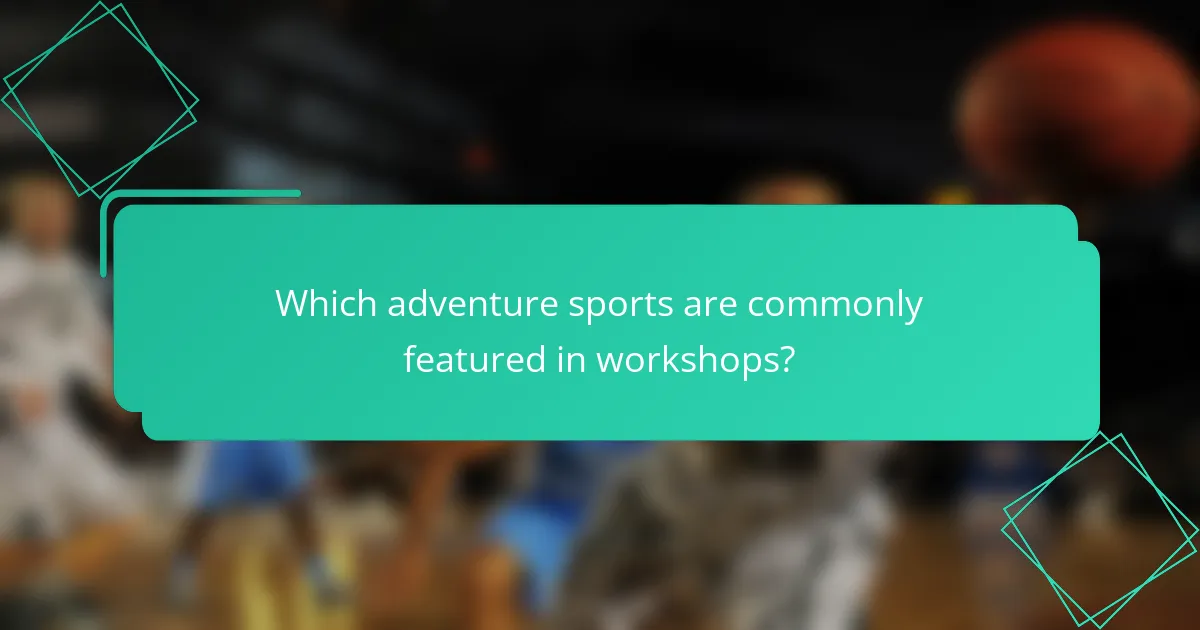
Which adventure sports are commonly featured in workshops?
Adventure sports commonly featured in workshops include rock climbing, kayaking, mountain biking, and zip-lining. These activities enhance skills and foster networking among enthusiasts. Workshops often emphasize safety training, technique improvement, and teamwork. Participants gain hands-on experience and build connections within the adventure sports community.
How does rock climbing contribute to skill development?
Rock climbing significantly enhances various skills essential for personal and professional development. It fosters problem-solving abilities as climbers navigate complex routes, promoting critical thinking. Additionally, it builds physical strength and endurance, contributing to overall fitness. Socially, rock climbing encourages teamwork and communication, as participants often rely on each other for safety and motivation. Workshops focused on rock climbing can further enhance these skills through structured challenges and networking opportunities, allowing individuals to connect with like-minded enthusiasts and professionals in the adventure sports community.
What role does kayaking play in team dynamics?
Kayaking enhances team dynamics by fostering collaboration, communication, and trust among participants. It encourages individuals to work together towards a common goal, improving their problem-solving skills.
Through shared experiences in challenging environments, team members develop stronger relationships and mutual respect. This bonding can translate into better performance in workplace settings, as participants learn to rely on one another.
Moreover, kayaking workshops often include debriefing sessions that reinforce lessons learned, allowing teams to reflect on their dynamics and identify areas for improvement. This structured feedback promotes continuous growth and cohesion within the group.
Overall, kayaking serves as an effective tool for enhancing teamwork and building a supportive network among participants.
Which unique workshops are offered in specific regions?
Adventure sports workshops are offered in various regions, focusing on skill enhancement and networking. Unique workshops include rock climbing in Colorado, white-water rafting in Oregon, and paragliding in the Swiss Alps. Each location provides specialized training and opportunities to connect with industry professionals. For example, Colorado’s workshops emphasize technical climbing skills, while Oregon’s focus on teamwork and safety in rafting.
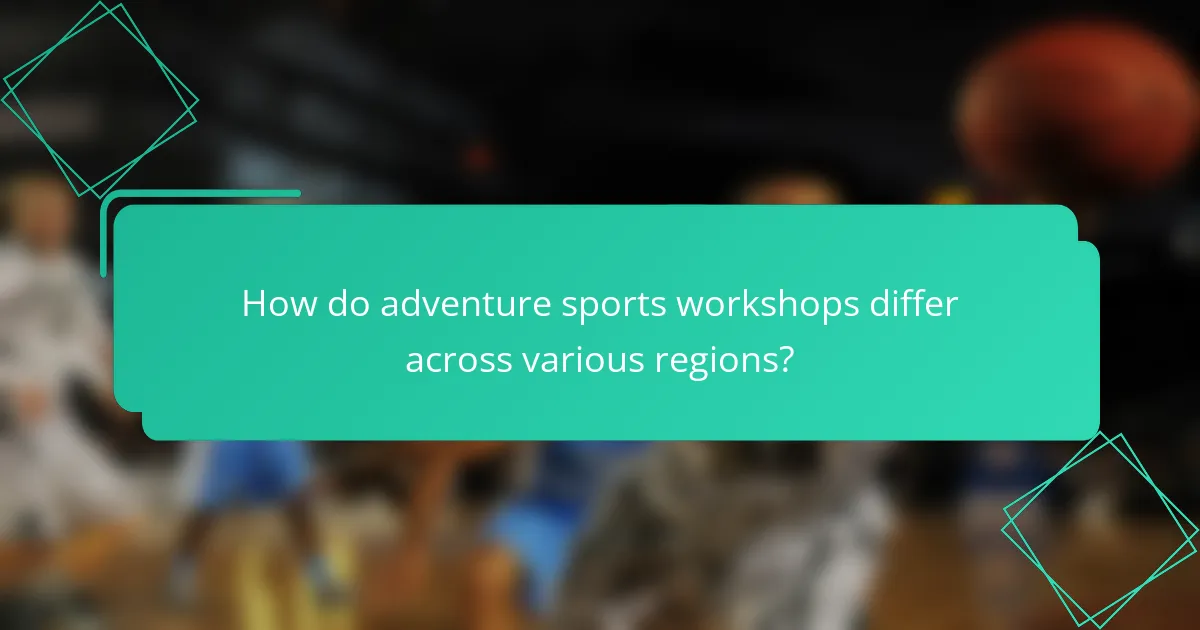
How do adventure sports workshops differ across various regions?
Adventure sports workshops vary significantly across regions due to cultural influences, available resources, and local expertise. In mountainous areas, workshops often focus on climbing and trekking, while coastal regions emphasize water sports like surfing and kayaking.
Regional differences also manifest in the types of equipment used, safety protocols, and training methodologies. For example, workshops in the Alps may prioritize mountaineering techniques, whereas those in the Caribbean might concentrate on snorkeling and scuba diving skills.
Networking opportunities differ as well; urban workshops may attract a diverse group of participants, while rural settings might foster closer community ties. Each region’s unique attributes shape the overall experience and skill enhancement potential for participants.
What cultural factors influence workshop formats in North America?
Cultural factors such as community values, local traditions, and environmental awareness significantly influence adventure sports workshop formats in North America. Workshops often reflect regional preferences, promoting skill enhancement while fostering networking opportunities.
For example, in areas with strong outdoor cultures, workshops may prioritize hands-on experiences and group activities, enhancing collaboration. Additionally, cultural attitudes toward risk and safety shape the instructional methods used, with some regions favoring more structured environments while others embrace a more free-form approach.
Furthermore, the integration of diverse cultural backgrounds in participants can lead to unique workshop designs that celebrate various adventure sports traditions. This diversity enriches the learning experience and encourages broader networking among participants.
Overall, understanding these cultural nuances helps organizers create workshops that resonate with local communities and effectively meet the needs of participants.
How do European workshops prioritize safety and regulations?
European workshops prioritize safety and regulations by adhering to strict guidelines and standards. They implement comprehensive risk assessments to identify potential hazards in adventure sports activities. Regular training for instructors ensures they are equipped to handle emergencies effectively. Workshops also emphasize participant safety through mandatory gear checks and safety briefings before activities. Furthermore, they comply with local and international regulations, fostering a culture of accountability and continuous improvement in safety practices.
Which innovative technologies are integrated into workshops in different areas?
Adventure sports workshops integrate innovative technologies such as virtual reality, drones, and wearable fitness trackers to enhance skill development and networking opportunities. These tools provide immersive experiences, real-time data analysis, and improved safety measures.
Virtual reality simulates various adventure scenarios, allowing participants to practice skills in a controlled environment. Drones capture aerial footage, providing unique insights into technique and performance. Wearable fitness trackers monitor vital statistics, enabling personalized feedback and performance tracking during activities.
These technologies foster collaboration and networking among participants, creating a community focused on skill enhancement and shared experiences. As a result, adventure sports workshops become more engaging and effective in developing competencies.

What challenges do participants face in adventure sports workshops?
Participants in adventure sports workshops face challenges such as physical demands, fear management, skill variability, and environmental factors. These aspects can hinder their overall experience and learning.
Physical demands often include stamina and strength requirements, which vary by sport. Fear management is crucial as participants confront risks inherent in activities like rock climbing or white-water rafting. Skill variability among participants can create disparities in learning pace and confidence levels. Environmental factors, such as weather conditions or terrain challenges, can also impact safety and enjoyment.
Addressing these challenges is essential for enhancing skill development and fostering effective networking among participants.
How can overcoming personal fears enhance the workshop experience?
Overcoming personal fears significantly enhances the workshop experience by fostering personal growth and boosting confidence. Participants who confront their fears during adventure sports workshops often discover new skills and capabilities. This process encourages networking as individuals bond over shared challenges and triumphs. Engaging in activities like rock climbing or zip-lining cultivates resilience, which can lead to improved performance in both personal and professional realms. Ultimately, facing fears transforms the workshop into a powerful platform for skill enhancement and meaningful connections.
What common physical limitations should participants consider?
Participants should consider their physical limitations, such as strength, endurance, and flexibility, when engaging in adventure sports workshops. Understanding these aspects helps ensure safety and maximizes skill enhancement. Common limitations may include cardiovascular fitness, joint mobility, and previous injuries. It’s essential to assess personal capabilities and consult with instructors to tailor activities appropriately.
How do workshops address environmental sustainability?
Adventure sports workshops enhance environmental sustainability by promoting eco-friendly practices among participants. These workshops often include training on Leave No Trace principles, which encourage minimal impact on natural environments. Participants learn to respect ecosystems, reducing their carbon footprint during activities. Networking opportunities foster collaboration on sustainability initiatives, leading to community-driven conservation efforts. As a result, adventure sports enthusiasts become advocates for environmental stewardship, influencing a broader audience.
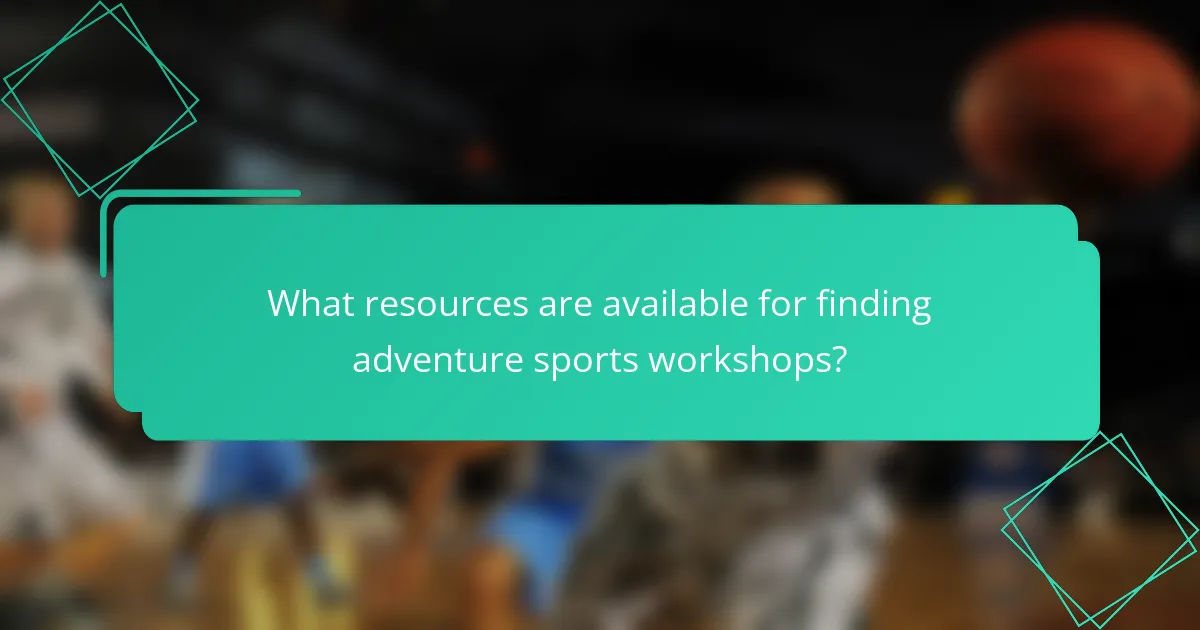
What resources are available for finding adventure sports workshops?
Numerous resources exist for locating adventure sports workshops, enhancing skills and networking opportunities. Online platforms like Meetup and Eventbrite list various workshops. Local adventure sports clubs often host events, providing community connections. Social media groups focused on adventure sports can also share workshop information. Additionally, websites of adventure sports organizations frequently post schedules for upcoming workshops.
Which online platforms provide comprehensive listings of workshops?
Several online platforms provide comprehensive listings of adventure sports workshops. Notable options include Eventbrite, Meetup, and Skillshare. These platforms feature a variety of workshops focusing on skill enhancement and networking opportunities in adventure sports. Eventbrite offers detailed event descriptions and user reviews, while Meetup emphasizes community building among participants. Skillshare provides online classes that can complement in-person workshops, expanding learning opportunities. Each platform caters to different preferences and needs, ensuring a wide range of options for enthusiasts.
How can social media be leveraged for networking opportunities?
Social media can enhance networking opportunities in adventure sports workshops by connecting participants, sharing experiences, and promoting events. Platforms like Instagram and Facebook allow users to showcase skills and achievements, attracting potential collaborators and sponsors. Engaging content, such as videos and photos from workshops, fosters community and encourages interaction. Networking through social media can lead to partnerships, mentorships, and job opportunities in the adventure sports industry.
What criteria should participants use to choose the right workshop?
Participants should consider their skill level, workshop focus, instructor expertise, and networking opportunities when choosing an adventure sports workshop. Evaluating these criteria ensures a beneficial experience.
Skill level is crucial; beginners may prefer introductory workshops, while advanced participants seek specialized training. The workshop focus should align with personal goals, such as climbing, kayaking, or team-building. Instructor expertise can significantly impact learning; check their qualifications and experience in the field. Lastly, consider networking opportunities; workshops that encourage interaction can enhance connections within the adventure sports community.
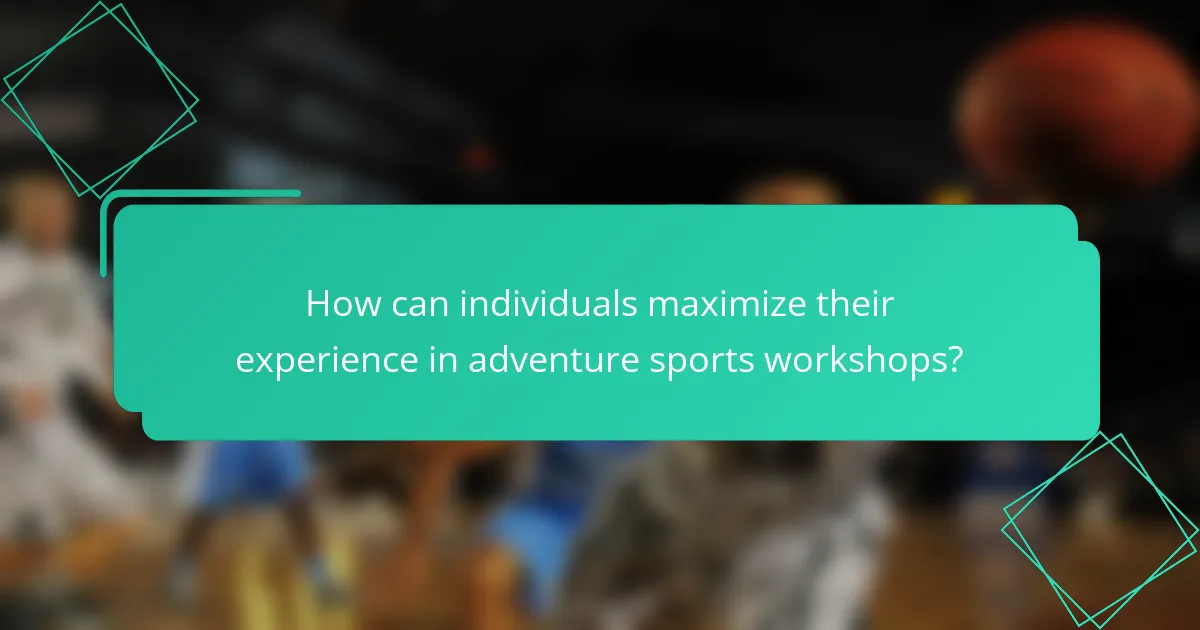
How can individuals maximize their experience in adventure sports workshops?
To maximize experience in adventure sports workshops, individuals should actively engage in all activities, network with instructors and participants, and seek feedback on their skills. Prioritizing goal setting enhances personal growth.
Participating in diverse activities improves skill sets. Networking fosters connections that can lead to future opportunities. Seeking constructive criticism from experienced instructors accelerates learning.
Staying open-minded and adaptable allows individuals to embrace new challenges. Regular practice reinforces skills learned during workshops.
Attending multiple workshops can provide varied perspectives and techniques, further enriching the overall experience.
What preparation strategies enhance skill acquisition?
Effective preparation strategies for adventure sports workshops include goal-setting, skill assessments, and tailored practice sessions. These strategies enhance skill acquisition by providing clear objectives and personalized training plans. Engaging in networking activities, such as group challenges and mentorship, fosters collaboration and knowledge sharing among participants. Additionally, incorporating feedback mechanisms allows for continuous improvement and adaptation throughout the workshop.
Which follow-up practices ensure continued skill development?
Continued skill development in adventure sports workshops can be ensured through consistent practice, mentorship, and community engagement. Regularly participating in follow-up sessions reinforces learned techniques and introduces new challenges. Networking with experienced athletes and instructors fosters knowledge sharing and motivation. Additionally, setting personal goals and tracking progress can enhance accountability and skill acquisition.
What common mistakes should participants avoid during workshops?
Participants should avoid distractions, lack of preparation, and negative attitudes during adventure sports workshops. Distractions can hinder focus and learning. Being unprepared limits skill enhancement opportunities. A negative attitude can impact networking and overall experience. Emphasizing teamwork and open-mindedness enhances the workshop’s benefits.
